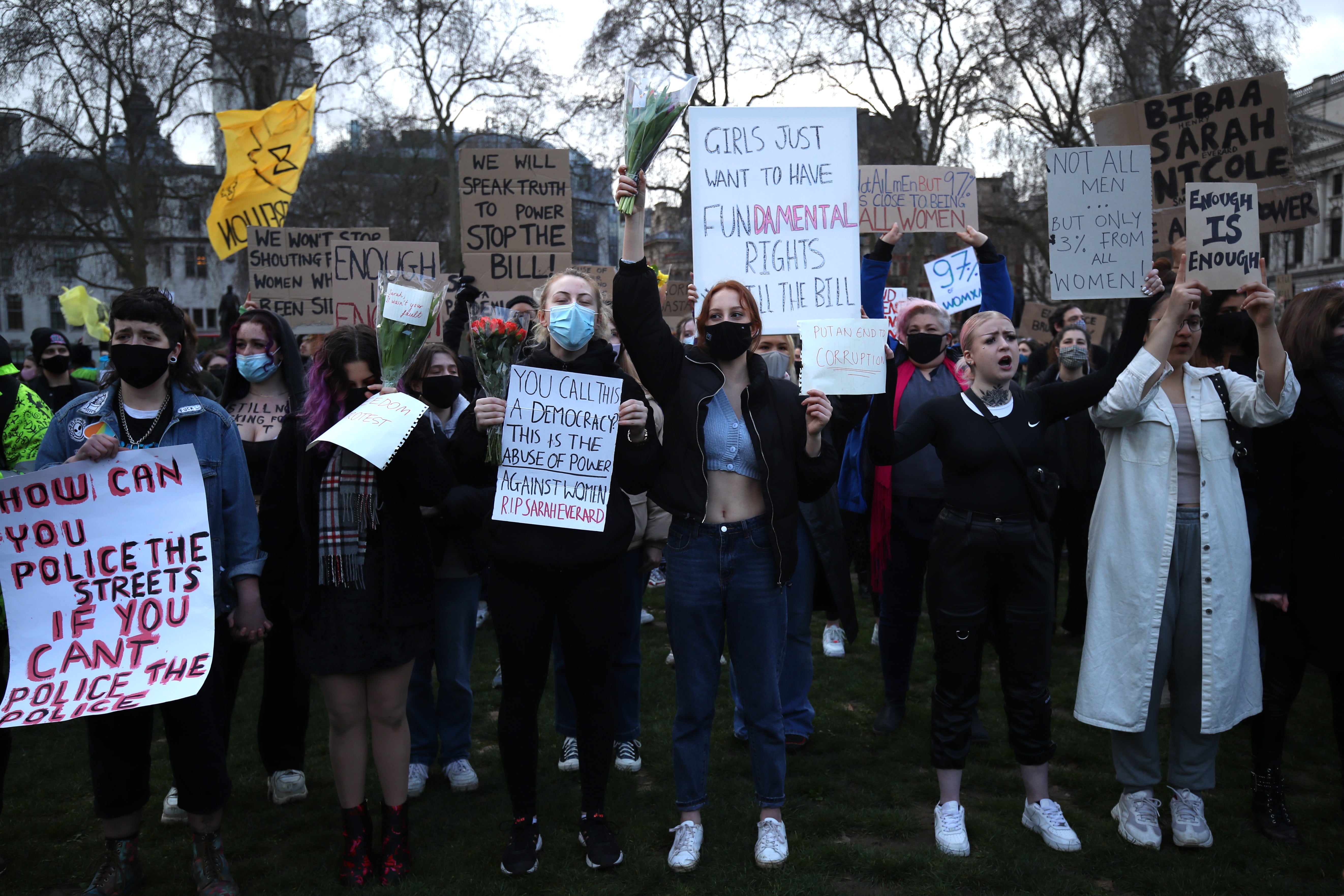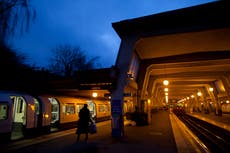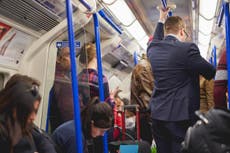‘Legitimate distrust in state’: Women now feel far more at risk walking home alone at night, polling finds
Exclusive: Survey by YouGov finds almost two-thirds of women now feel in danger

Your support helps us to tell the story
From reproductive rights to climate change to Big Tech, The Independent is on the ground when the story is developing. Whether it's investigating the financials of Elon Musk's pro-Trump PAC or producing our latest documentary, 'The A Word', which shines a light on the American women fighting for reproductive rights, we know how important it is to parse out the facts from the messaging.
At such a critical moment in US history, we need reporters on the ground. Your donation allows us to keep sending journalists to speak to both sides of the story.
The Independent is trusted by Americans across the entire political spectrum. And unlike many other quality news outlets, we choose not to lock Americans out of our reporting and analysis with paywalls. We believe quality journalism should be available to everyone, paid for by those who can afford it.
Your support makes all the difference.Women feel far less safe walking home alone at night than they did three years ago, with almost two-thirds now feeling in danger, new research has found.
Exclusive polling by YouGov, carried out for The Independent, discovered some 63 per cent of women who walk by themselves at nighttime “always” or “often” feel unsafe.
This is an increase of 17 points from the 46 per cent of women who reported feeling this way in a poll three years ago.
Campaigners attribute the rise to eroding trust in the police since the kidnapping, murder and rape of Sarah Everard by a serving Metropolitan Police officer in March.
One in five women choose not to ever walk alone at night in the first place – a proportion twice as high as for men.
Researchers discovered that the number of women who say they take frequent measures to protect themselves from sexual assault has also increased. In 2018, a third of women said they took precautions, while some 41 per cent now say the same.
Leigh Morgan, a senior legal officer at Rights of Women, a leading legal rights charity, told The Independent the findings demonstrate “the extent of women’s legitimate distrust in the state’s ability to keep them safe”.
She added: “The state is failing to keep women and girls safe by prioritising cosmetic initiatives over prevention.
“The survey results echo what we already know: the state’s focus on creating more police powers and technological gimmicks do nothing to restore women and girls’ trust in a system that has failed to address the ongoing crisis of male violence against women and girls.”
Her comments come after a new “888” tracking service for women travelling alone – proposed by BT and backed by home secretary Priti Patel – was dismissed earlier in the month as “terribly misguided” and “flawed” by campaigners who fear freedoms and privacy are being eroded.
The government’s controversial new policing bill has been widely criticised by campaigners for rolling back human rights – with many fearing the legislation will compound the pre-existing over-policing and criminalisation of marginalised communities.
“It constitutes an attack on our fundamental rights, which is particularly harmful to women’s rights given the long and ongoing history of how the movement secures change through protest and resistance,” said Andrea Simon, director of the End Violence Against Women Coalition.
“We’ve been made aware that not only did a policeman kill a woman walking on her own, we’ve also been made aware police don’t take violence against women seriously.”
Researchers found that women are significantly more likely than men to say they are scared in routine day-to-day situations such as exercising at the gym alone, waiting at a pub alone for a friend to arrive, getting a taxi or rideshare alone, or going on holiday abroad alone.
More women voiced fears about daily activities now than they did three years ago, such as walking down an alley on their own at any time of day, with this rising from 49 per cent of women to 63 per cent.
The number who are anxious about feeling safe to go on a first date rose from 15 per cent to 28 per cent and the proportion of women who are fearful about exercising in an outdoor public space by themselves increased from 14 per cent to 21 per cent.
Charlotte Kneer, who runs domestic abuse shelters on the outskirts of London, said she did not think life had grown more dangerous for women but it was their own perceptions that have been altered.
Ms Kneer, chief executive of Reigate and Banstead Women’s Aid refuges in Surrey, added: “The case of Sarah Everard, where she was murdered by a serving police officer, will have increased women’s anxiety because it fundamentally alters our perception of police being the people who keep us safe.
“We’ve been made aware that not only did a policeman kill a woman walking on her own, we’ve also been made aware police don’t take violence against women seriously.”
She said that several other high-profile killings – such as the murder in London parks of sisters Bibaa Henry and Nicole Smallman, and the death of Sabina Nessa – will have also contributed to fears.
“We identify with these women who were just minding their business doing ordinary day-to-day things,” said Ms Kneer, a domestic abuse survivor whose violent partner was jailed for seven years in 2011.
She also noted that research has found women felt more scared leaving the house in the wake of lockdown as there were fewer people on the streets. This anxiety could have continued post-lockdown, she added.
Maya Tutton, who runs the Our Streets Now campaign to end street harassment with her sister Gemma, told The Independent the fresh data is an “indictment on our society” as she warned “pervasive fear” is curbing the “human rights of women, girls and marginalised groups”.
She said: “The fact that so many women and marginalised groups feel unsafe while in public space clearly speaks to the scale of male violence in our society.
“What is particularly striking, too, is the increase in women who are actively taking steps to protect themselves from sexual assault. This seems to reflect the victim-blaming messages in our society, those narratives which continue to place the onus on women to change their behaviour rather than on perpetrators to stop being violent.”
A survey by UN Women in the spring found 97 per cent of young women in the UK said they had been sexually harassed, while 80 per cent reported experiencing sexual harassment in public spaces. The poll of more than 1,000 women, aged between 18 and 24, found the sexual harassment included being groped, followed and coerced into sexual activity.
Meanwhile, previous research by charity Plan International found one in three girls in the UK have been harassed in their school uniforms.
Deniz Uğur, deputy director of the End Violence Against Women Coalition, told The Independent: “Violence and abuse is regularly trivialised and normalised, victims are blamed and, despite significant numbers of police officers abusing their power to harm women, few face meaningful consequences.
“Women are tired of the constant risk assessments and invisible safety work we have to do to keep ourselves safe from male violence. Black and minoritised women are on the sharp edge of this, with racism and sexism leaving them facing greater risks, experiencing compounded abuse and even more barriers to justice and support.”
A Home Office spokesperson said they are “funding a new national policing lead for violence against women and girls in recognition of the seriousness of these crimes” - adding that the Home Secretary “will chair a cross-government taskforce to drive action and improvements in this area.”
The spokesperson said they were pouring an extra £25 million into the Safer Streets Fund for measures to make women and girls feel safer in public areas, as well as rolling out on online tool, StreetSafe, where members of the public can anonymously report areas in which they feel at risk.
While National Police Chiefs’ Council Chair, Martin Hewitt, said: “There are issues for the whole of policing that need to be examined and acted on, from vetting to professional standards, to how predatory or misogynistic behaviour is challenged.”
Mr Hewitt added: “Police chiefs are listening to women’s voices about what needs to change. This polling raises concerning figures, and we understand that many women will be feeling afraid, with their trust in police dented. We’ll in part rebuild trust through the professionalism and public service of police officers and police staff in their everyday actions.”





Join our commenting forum
Join thought-provoking conversations, follow other Independent readers and see their replies
Comments